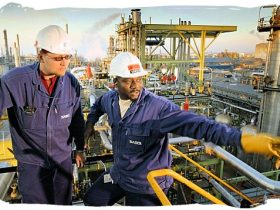
Mauritania’s main businesses
Mauritania, a West African country, has an economy primarily driven by natural resource extraction, agriculture, and fishing, alongside some emerging sectors. Below is an overview of its main businesses:
1. Mining and Natural Resources
Mauritania is rich in mineral resources, making mining one of the key drivers of its economy.
Iron Ore Mining: Mauritania is one of Africa’s top iron ore exporters. The industry is dominated by the state-owned company, Société Nationale Industrielle et Minière (SNIM).
Gold Mining: Companies like Kinross Gold, through its Tasiast mine, are significant players in Mauritania’s gold mining sector.
Copper and Other Minerals: Copper mining also contributes to the economy, along with small-scale exploration of gypsum and phosphates.
2. Oil and Gas Exploration
Mauritania has untapped reserves of oil and gas. Offshore exploration activities, particularly in the Banda and Tortue fields, are carried out by companies such as BP and Kosmos Energy.
The development of the Greater Tortue Ahmeyim gas project promises substantial economic gains.
3. Fisheries
The Atlantic coastline provides a rich fishing ground, making fisheries another key sector.
Mauritania exports fish and seafood, mainly to the European Union and Asia. Companies and cooperatives operate fishing fleets and processing facilities.
Government agreements with international entities, like the EU, help boost revenues but have also sparked concerns about overfishing.
4. Agriculture and Livestock
Agriculture accounts for a smaller portion of GDP but remains crucial for livelihoods.
Main crops include millet, sorghum, and rice, mostly grown in the Senegal River Valley.
Mauritania is also known for its livestock farming, with cattle, sheep, and goats being major exports to neighboring countries.
5. Renewable Energy
With abundant sunlight and wind, Mauritania is exploring renewable energy projects.
Solar and wind farms are being developed, with government initiatives aiming to reduce dependence on fossil fuels.
6. Infrastructure and Construction
Infrastructure projects, such as roads, ports, and housing, are growing due to investments from foreign partners, including China.
Nouakchott’s port and infrastructure expansions are critical for trade and transportation.
7. Tourism
Despite its potential, tourism in Mauritania is underdeveloped, mainly due to security concerns.
The Adrar region, ancient cities like Chinguetti, and the Banc d’Arguin National Park attract niche eco-tourism.
8. Banking and Financial Services
Financial services are expanding, with several domestic and foreign banks offering services. The Central Bank of Mauritania regulates the sector.
Efforts to promote microfinance aim to improve financial inclusion.
Challenges and Opportunities
Mauritania faces challenges such as political instability, reliance on commodity exports, and environmental issues. However, the diversification of its economy, investment in infrastructure, and strategic partnerships are paving the way for growth.
With its natural resource wealth and growing energy sector, Mauritania is positioning itself as a hub for mining, energy, and regional trade.



Leave a Reply